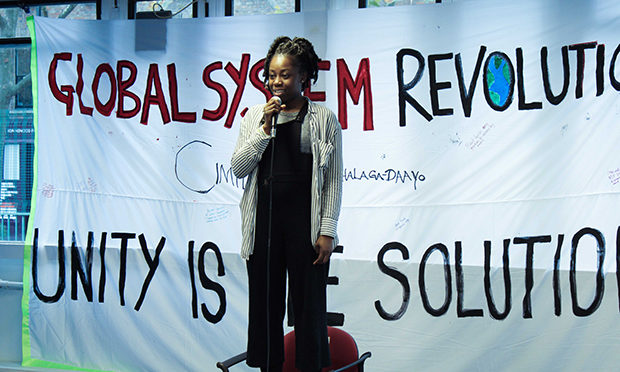‘Why don’t I see myself in activist mode?’ Playwright Nessah Muthy on class, climate, and sustainable theatre

Multi-award-winning writer Nessah Muthy’s sustainably-made and mobile play was shown to sold-out audiences in Hackney and other boroughs over a period of eleven days this month.
Muthy examines the intersection between climate activism and class division in How To Save The Planet When You’re A Young Carer And Broke, which follows the story of Lavisha Smith, a mixed-race 14-year-old caring for her disabled mother on an estate in London.
The play came to be when the writer pitched the story, inspired both by her own lived experience and by what she had seen in the news.
Muthy told the Citizen: “I picked this idea and this central quandary, which was very personal but also playing out in a political way […] which was the intersection, or lack [there]of, between climate change activism and working class or benefit class activism.
“There’s a very personal excavation [in the writing of the play] as a working class person. Why don’t I really see myself in an activist mode? Why does [climate activism] feel quite disconnecting to me?”
She added: “The working class, as a group, there’s an idea or a feeling that they’re being lectured to and being told what they should and shouldn’t do.
“I work in theatre, and theatre is so dominated by middle class people. So I was just interested in what that might mean.”

The play manages to be sustainable by encouraging audience members to provide props from what they’ve brought with them, and Muthy said that it was essential that eco-consciousness be woven into the production.
“It was inherent that we knit in the kind of ideology of the play into the way it was made,” she said. “[The making and writing of the play] were kind of in symbiosis, and should always be feeding each other. So [sustainability] was literally written into the DNA before I started writing.”
Although Muthy went in with an idea of the experiences she would draw from to inspire the play, she stressed that she was eager to learn during the writing process.
What emerged was that the two distinct activist movements were actually far more intertwined than she had ever realised.
“When I first started writing the play, I felt this overwhelming sense of individual responsibility, but also apathy,” she said. “I had quite a negative defeatist attitude.
“One of the pivotal images for me was one of [climate] activists being glued at the top of Canning Town Station, and seeing news clippings of people shouting at them, saying ‘I need to get I need to go to work because I need to feed my kids.’
“What we come to realise with the play is that collective action and, without sounding too hippyish, self-care, and doing what you can do, that’s our superpower.”
